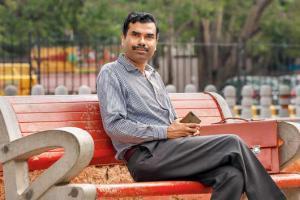A first-of-its-kind book, which documents the history of public speeches in India, discusses how it influenced the country's freedom struggle

Priyadarshi Dutta
Where revolutionary speechmaking today is concomitant with any formidable politician, in Poona of the 1870s, it seemed unusual. The Poona Sarvajanik Sabha, which at the time nurtured many leaders, used speeches—if anything—to make "demands in polite terms". This perhaps explains why when Vasudeo Balwant Phadke (1845-83), a military finance officer, would run "through the streets of Poona with a thala (plate) and ladle in his hands" announcing his forthcoming speech: "All should come to Shaniwarwada grounds this evening. Our country must be free," the young man made a lot of people uncomfortable. His speeches always excited the audience. "They were no academic discourses... They appealed to people's common sense with straightforward logic. Full of patriotism, as much as denunciation of the British, they touched a raw nerve in the people."
ADVERTISEMENT
In a new book, The Microphone Men (Indus Source Books), writer Priyadarshi Dutta traces the trajectory of radical leaders like Phadke, who laboured to reshape the political destiny of India, through oratory or public speaking. "When we speak of the history of oratory, what comes to mind is the great orators of ancient Greece and Rome," says Delhi-based Dutta, who has previously worked at the Rajya Sabha Secretariat, and as consultant in the Information and Broadcasting Ministry. "Even in the West, oratory was eclipsed in the Medieval period, only to begin after the French and American revolution. As someone who has always been passionate about history, I was curious to find out whether the history of oratory in India had ever been documented or analysed. Unfortunately, while researching I realised that no study had been done," said Dutta in a telephonic interview.
The reason for this oversight, as he explains in his book, is that speechmaking is often erroneously confused with the "human faculty of speech". "Most people think that speechmaking existed since time immemorial," he writes. But Dutta argues that like journalism, it was a change in the "thinking pattern" that led to the rise of speechmaking in India, and which he says came into its own, only in the 19th century. Here, he gives credit to Raja Ram Mohan Roy (1772-1833), often known as the Father of the Indian Renaissance, for exposing Indians to the gift of prose. "Before the coming of the British, much of our literature used to be poetry or verse. Prose became a dominant form only during the Colonial Era. And it began with Roy. We have only two speeches, that too only half of them on record, but he was the first person to write analytical pieces on contemporary events, including judicial and revenue reforms, and press freedom. For me, he, along with Dwarkanath Tagore, are the Pioneers of Oratory," he says.
The book opens with Roy, and covers the period till before the Independence of India, with significant voices from the Bombay Presidency. In Mumbai, then Bombay, Dutta says Bal Gangadhar Shastri Jambhekar (1812-1845), was the first to take "baby steps into oratory". He co-founded the bilingual newspaper, The Bombay Durpan, which aimed to "open a field for free and public discussion on points connected with the prosperity of this country, and happiness of its inhabitants". Naoroji Furdunji and Dadabhai Naoroji were other seminal orators, followed by Badruddin Tyabji, Pherozeshah Mehta and Kashinath Trimbak Telang, all barristers. "Bombay had a very independent outlook, and was the centre of commerce. If you read the speeches of Mehta, or Telang, you will realise that they were mostly interested in policy matters. Some, even tried to make substantial intervention in the policy. But often due to the obdurate British bureaucracy, their suggestions were not accepted. Nevertheless, their contribution cannot be ignored," he says. For instance, in a speech at the Town Hall in 1871, Mehta asserted that the Bombay Municipal Corporation ought to be founded on a "larger popular basis". It would be another four years before Dossabhoy Framji was nominated as the chairman of corporation, the first Indian to occupy the post. The Marathi Brahmins of Poona—Mahadev Govind Ranade and Bal Gangadhar Tilak—closely followed in their footsteps. "We cannot overlook the role they played in the growth of the spirit of representative government," says Dutta, who spent several months leafing through the digitised archives in the National Digital Library of India, as many of the book, comprising these speeches, were long out of print. "Oratory is often described as an art. But, while the purpose of art is to amuse, our speeches achieved something greater—it paved the way for independent India."
Catch up on all the latest Crime, National, International and Hatke news here. Also download the new mid-day Android and iOS apps to get latest updates
 Subscribe today by clicking the link and stay updated with the latest news!" Click here!
Subscribe today by clicking the link and stay updated with the latest news!" Click here!






